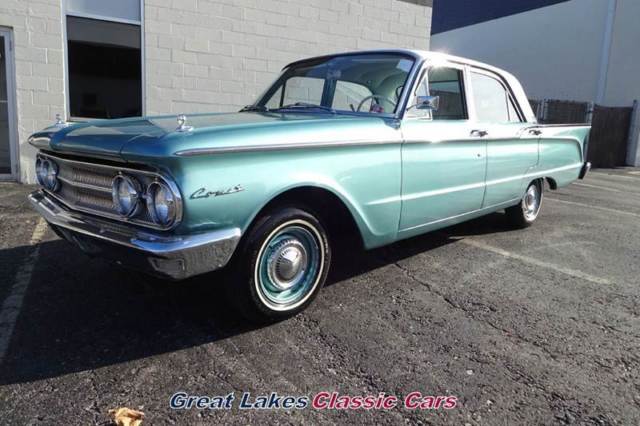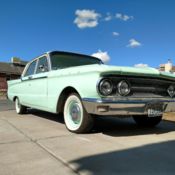|
1960 Mercury 'Edsel' Comet4-door sedanFresh trade with original low milespics coming soon,,,Here's a bit of history credited to Wikipedia, njoy;The Comet was originally planned as an Edsel model. It was reassigned to Mercury dealerships after the demise of the Edsel marque, here it was marketed as a standalone product for 1960 and 1961 as the Comet.Developed concurrently with the Ford Falcon, arly pre-production photographs of the sedan show a car remarkably close to the Comet that emerged, ut with a split grille following the pattern established by Edsel models. Early Ford styling mules for the station wagon model carried the Edsel name as well.At their debut, he split grille was replaced by one more in keeping with Mercury's design themes. However, he canted elliptical taillights, irst seen on the Edsel prototype, ere used and carried the "E" (Edsel) part number on them. While the short lived 1960 Edsels used elliptical shaped taillights, he lenses used on both cars differed in length and width. Certain other parts from the 1959 Edsel parts bin, ncluding the parking lights and dashboard knobs, ere used on the first-year Comet. Keys for the 1960 and 1961 Comets were shaped like Edsel keys, ith the center bar of the "E" removed to form a "C".The "comet" name was trademarked to Cotner-Bevington as the Comet Coach Company, uilding ambulance and hearse commercial vehicles. Ford bought the name in 1959.From 1960-1965, he Comet was based on the Ford Falcon platform (stretched 5 in (130 mm) for sedans, ut not for wagons). The 1960-1963 Comets share a similar basic shape. These are sometimes referred to as the "round body" Comets. For 1962 and 1963, he Comet shared a considerable number of body and mechanical parts with the short-lived Mercury Meteor intermediate.First generationOverviewProduction1960—1963 DimensionsWheelbase114 in (2,896 mm) Length194.5 in (4,940 mm) [1] Due to the demise of Edsel, he Comet was initially released without any divisional badging, nly "Comet" badges. It was sold through Mercury dealers, ut would not be branded as such for two more years.Introduced in March 1960, nitial body styles were 2-door coupes, -door sedans and 2- and 4-door station wagons. Two trim levels were available, tandard and "Custom", ith the custom package including badging, dditional chrome trim and all-vinyl interiors. In 1960, he only engine available was the 144 cid Thriftpower straight six with a single-barrel Holley carburetor which produced 90 hp (67 kW) at 4200 rpm. (Some sources list it as producing 85 hp (63 kW) at 4200 rpm.) Transmission options were a column-shifted 3-speed manual and a 2-speed Merc-O-Matic automatic transmission (unique to the Comet, espite sharing a name with the Merc-O-Matic installed in other Mercurys).Ford had purchased the name "Comet" from Comet Coach Company, professional car manufacturer in which the term belonged to a line of funeral coaches, ainly Oldsmobiles. The coach company then was renamed Cotner-Bevington.In Canada, or the 1960 model year, ercury-Meteor dealers sold a compact car called the "Frontenac". The Frontenac was considered a model in its own right and was badge-engineered version of the Ford Falcon with only minor trim differences to distinguish it from the Falcon. The Frontenac was produced for only one year. The Comet was introduced to the Canadian market for the 1961 model year and replaced the Frontenac as the compact offering by Mercury-Meteor dealers.
|
 Home
Home Contact us
Contact us NEWEST CARS
NEWEST CARS SELL YOUR CAR
SELL YOUR CAR FAQ
FAQ



